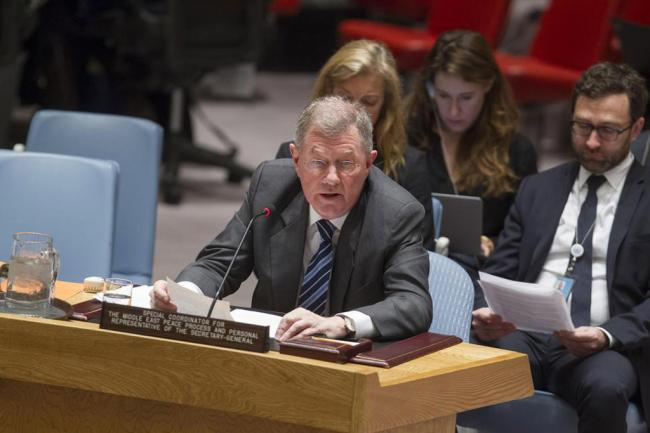27 Mar 2015, 03:16 pm Print

“Upon leaving this position, I cannot but express an overriding feeling that I have been part of a peace process in which a can is kicked down an endless road,” said Robert Serry, who served as the Secretary-General’s Special Representative to the Middle East for the last 7 years. Replacing Mr. Serry will be Nikolay Mladenov, former head of the UN Assistance Mission for Iraq.
“Losing sight of reaching peace between Israel, Palestine and the wider Arab world altogether – I have repeatedly warned the Council that we may be heading in this direction – would be tantamount to pouring more oil on the regional flames,” he added.
In any peace agreement Israeli peace concerns will need to be seriously addressed. Conversely, achieving a two-State solution and ending the occupation would go a long way towards improving regional security and strengthening moderate forces in the region.
While congratulating Israeli Prime Minister Benjamin Netanyahu on winning the 17 March election, Serry expressed concern by many of the “hardline statements” put forward in the final days of campaigning, in particular remarks by the Prime Minister raising serious doubts about Israel’s commitment to the two-state solution.
Serry also expressed concern over last month’s decision by the Palestine Liberation Organization (PLO) to suspend all forms of security coordination given Israel’s systematic and ongoing noncompliance with its obligations under signed agreements.
“We cannot run from reality. There is a genuine possibility that ending Palestinian security coordination with Israel may be the final nail in the coffin of the Oslo Accords. However, there is still time for parties to end the cycle of counterproductive action and counteraction,” he added.
Israel’s withholding of Palestinian tax revenues for the third month, now amounting to over $400 million dollars, is deepening the financial crisis, the Special Coordinator warned, urging Israel to reverse this decision. It has been five months since the UN facilitated a humanitarian payment to Gaza civil servants, he added.
There has been some progress in Gaza, however, and as of 23 of March, almost 80 per cent of damaged shelters have been processed through the Gaza Reconstruction Mechanism (GRM), with over 61,000 individuals having procured construction materials to carry out their home repairs.
Meanwhile, the situation in the West Bank, including East Jerusalem, remains tense, Serry said.
Citing numbers from an Israeli non-governmental organization, Serry said that from January 2008 to January 2014 the population in settlements in the West Bank, including East Jerusalem steadily increased by an estimated 16 per cent to a total 551,500 persons.
“I frankly do not know if it is already too late. The minimum conditions of trust cannot be restored without the new Israeli government taking credible steps to freeze settlement activity,” Serry said.
He called for the prioritization of Gaza meaning “we must fix Gaza – or at least stabilize it – so that we do not reconstruct it for a third time only to see it destroyed again and so that it does not halt peace efforts which aim to reach the long desired two-state vision.”
‘Prioritizing Gaza’ means achieving four objectives urgently. First, a stable ceasefire under the umbrella of the Government of National Consensus, and second, Palestinians must move towards “real reconciliation”.
Serry thanked the UN family on the ground for their indispensable role in “picking up the pieces” following last summer’s war in Gaza. Urging the Security Council to play a role in developing a peace architecture for resolving the conflict, Serry noted that during his tenure, the Council passed only two resolutions on Israel and Palestine and neither of these provided a strategy.
“Hasn’t the time come, Mr. President, for the Council to lead?” he asked.
Photo: UN Photo/Loey Felipe
- Ali Khamenei (1939–2026): Iran’s Supreme Leader who ruled with an iron grip
- Trump signs 10% global tariff, says it takes effect ‘almost immediately’
- BJP wins a seat in Bangladesh — But not the one you think!
- Meet Shabana Mahmood: Could she take over as UK’s first Pakistani-origin Muslim PM?
- Dalai Lama's Office breaks silence on Epstein claims





-1763561110.jpg)
